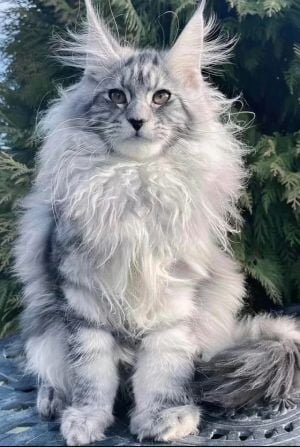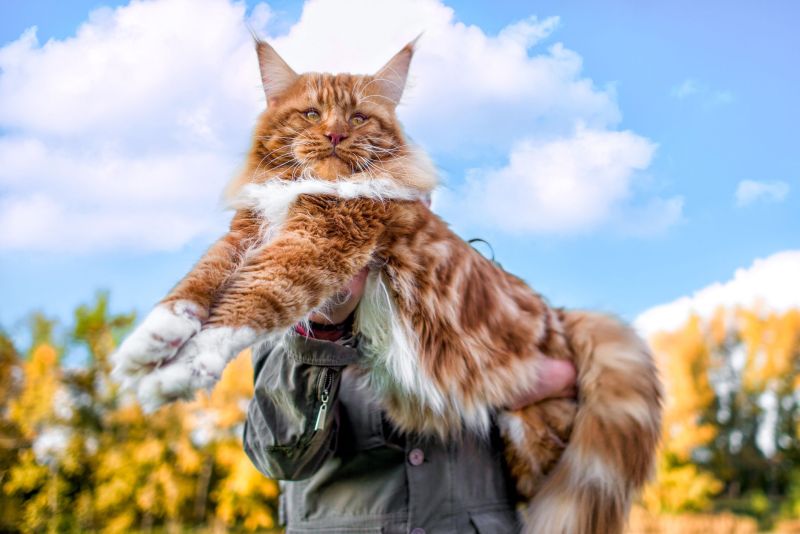
The Maine Coon is one of the largest breeds of domestic cat in the world – with males weighing on average up to 18 pounds and females up to 12 pounds. Its height ranges between 10 and 16 inches, and length – including the tail – up to 14 inches.
Along with the Norwegian Forest Cat, this long-haired breed native to the snowy Maine region is believed to have descended from cats brought overseas by either English seafarers or Norse Vikings.
The Maine Coon’s name is believed to have been given due to its bushy tail which resembles a raccoon’s.
Contents
Budgeting for A Big Cat
Maine Coons are pretty popular cats, so it isn’t too difficult to find a breeder by simply turning over a few stones on the internet. But finding a breeder isn’t as simple as just responding to an online advertisement.
A good breeder should be responsible, honest, and above all, not selling cats simply for profit. Most reputable breeders will be selling their Maine Coons as either show cats or as pets.
There is an abundance of catteries in North America offering Maine Coons for sale. Megacoon is a TICA outstanding cattery that specializes in breeding big, heavy-boned cats that have long ears and the “wild” look.
Kitten prices range from $1,600 to $2,400 depending on the sex, color, size, and quality. Shipping is not available.
MetatronEyes lists its Maine Coon cat prices as being $2,000 each. Similarly, Graro has young kittens for sale which cost from $800 to $1,100.
All TICA registered breeders provide a health certificate along with proof of pedigree when an animal is purchased. The cats are neutered/spayed in advance unless specified that a certain Maine Coon is needed for breeding purposes.
Another way to get a Maine Coon without having to pay too much is by adopting one. There are thousands of Maine Coon mixes in shelters around the United States, so if you don’t mind owning a mixed-breed cat, it’s recommended to adopt before searching out breeders.
At Maine Coon Adoptions, the rescue fee is $160 for kittens up to one year old, $135 for healthy cats from 1-8 years old, $110 for elderly and special needs cats, and $225 for purebreds.
Other Costs Associated with Purchasing/Adopting a Maine Coon
In some situations, a need may arise to ship a cat from one location to another, especially if the breeder’s cattery is too far from your home. Be aware that young kittens cannot and should not be shipped.
Make the flight if you have to, or look for a different breeder that’s closer. Adult cats can be shipped under certain circumstances. The cost to transport a cat depends on the shipping company.
uShip is a well-known company that specializes in domestic animal transportation. Its fees currently stand at $1.54 per mile to ship a cat 100 miles or less and $0.42 per mile to ship it 1,000 miles or less.
For example, a cat being transported from Richmond, VA to Osbornville, NJ may cost around $150. A Maine Coon shipping from Weatherby Lake, MO to Winter Park, FL could cost as much as $600.
Remember that the size of the cat will also factor into the cost.
Don’t forget to prepare a good cat carrier if you or a pet nanny is flying out your Maine Coon. An ideal one should have a soft and padded interior, plenty of ventilation, and pockets for easy storage.
Wheels are also a great feature. They make it easier for you push the cat around.
Look for a carrier that uses zippers or Velcro for the openings. A good one is the Petsfit Expandable Travel Carrier which costs around $40.
If your Maine Coon is heavier or larger than most, consider an Yvettevans Portable Top-Load Kennel for $35.
Maintenance Expenses That Might Hurt Your Bank Account

Getting a Maine Coon might seem like an awesome idea, but many people are unaware of the true costs associated with raising a pet. While you may be able to handle the initial costs, there are many different recurring expenses that might bust your wallet.
Ask yourself the question: can you afford to be a pet owner?
Although Maine Coons are a hardy breed, due in part to their adaptation to adverse weather conditions, studies have shown that they are still predisposed to a number of health concerns – most notably, feline hypertrophic cardiomyopathy (HCM).
It’s believed that middle-aged to elderly Maine Coons are more affected by the disease.
Spinal muscular atrophy (SMA) is another disease that is genetically inherited. To detect this disorder, a test is available from Neogen’s Geneseek Operations lab which costs $15.
In order to detect and treat any health problems that your Maine Coon might be having, regular physical exams are recommended. You’ll also need to shoulder the expenses associated with vaccinations, surgeries, and any other tests that are related to your pet’s health maintenance.
Here’s a sample of preventive care and wellness pricing, courtesy of the Arlington Animal Clinic in Massachusetts:
- Annual Physical Exam – $75
- Comprehensive Fecal Panel – $90
- Dental Procedure – $550 to $1,500
- Feline Heartworm / FIV / FeLV Panel – $60
- Feline Heartworm/Intestinal Parasite/Flea/Tick Preventive (12 Month Supply) – $70 to $200
- Home Again Microchip – $75
- Neuter – $250 to $300
- Spay – $550 to $650
- Vaccinations – $25 to $30 each
- Wellness Lab Work (CBC, Urinalysis, etc.) – $150 to $200
Be wary about how much you feed your Maine Coon, as an obese cat is prone to diabetes and other heart problems. A high-protein diet is recommended for this breed, and the cost of a good product like Royal Canin Maine Coon dry cat food is $30 for a 6-lb bag.
Maine Coons are also notable for being playful and they tend to get bored doing the same thing or playing the same toys on a over and over again. That’s why getting several toys that you can shuffle everyday is not a bad idea; although can be pretty heavy on the budget.
Some affordable items like Yeowww! Catnip Toy, Yellow Banana which costs around $8.50 or Cat Toy Variety Pack (20 pcs) – Activity Set of Mylar Balls, Chew Toys, Catnip Pouches, Play Mice & Bells for a little less than $8.00 can be purchased to keep your baby Maine Coon busy.
You can also opt to buy a scratching post to keep the scratches off your carpets and sofas. Since Maine Coons are on the tall and heavy side, you need to get a tall and sturdy scratching post and is made of tough fabric. The Pioneer Pet SmartCat The Ultimate Scratching Post would be ideal for the price of around $42.00.
License fees may also be applicable to your cat, depending on which city you live in. Many counties in the United States have laws limiting the number of pets that are allowed in any one area and almost all of them have mandated rabies vaccination and licensing.
According to OC Animal Care in Orange County, the cost of a 12-month license for both neutered and unneutered cats is $9.
Additional expenses to keep in mind and budget for come into play when traveling with your new Maine Coon.
When taking a pet across international or state borders, a health certificate is usually required, along with other documentation. The certificate should be signed by a qualified and accredited veterinarian.
Traveling internationally entails getting the certificate endorsed by the USDA. These health certificates always cost the same – $121 for 1-2 tests, $150 for 3-6 tests, and $173 for 7 or more tests.
The number and type of required tests depend on the laws of the country or state that you are traveling to.
Maine Coon Buyer’s Guide
Here are a few tips to help you make the correct choices when picking out a new kitten:
- Don’t be afraid to ask questions – breeders appreciate buyers that want more details.
- Ask to see the entire litter so that you can assess character and view the parents.
- Don’t choose the runt of the litter just because you feel sorry for it.
- Select a kitten that looks clean, healthy, and isn’t demonstrating any questionable behaviour.
- A Maine Coon kitten with a pot belly could be an indicator of worms.
- Check that the teeth and gums are healthy and there is no discharge from the nostrils.
- Before making a selection, ensure that you’re satisfied with litter’s living conditions.
